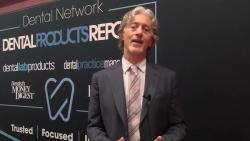- About Us
- Advertise
- Editorial
- Contact Us
- Terms and Conditions
- Privacy Policy
- Do Not Sell My Personal Information
© 2025 MJH Life Sciences™ and Dental Products Report. All rights reserved.
Addressing Unmet Needs in Early Childhood Oral Care
An interview with Ashley Lerman, DDS, pediatric dentist and founder of Firstgrin, a company working to educate and provide resources to parents and pediatricians to enhance early childhood dental health.
Video Transcript:
Noah Levine (NL): Hello, I'm Noah Levine Editorial Director with Dental Products Report. Today I'm joined by Dr. Ashley Lerman. She's the founder of Firstgrin and a pediatric dentist. Dr. Lerman. Thanks so much for joining us.
Ashley Lerman (AL): Thanks so much for having me. I'm excited to talk to you about my story. A little bit of background tell everyone about first grand. Wonderful.
NL: Well, to start right off, can you tell us a little bit about yourself? What led you to becoming a dentist?
AL: Absolutely. So I'm currently a board certified pediatric dentist. Both of my parents are in the dental field. My dad is a general dentist, my mom's a periodontist. So, grew up being around the office helping out. I remember being a kid and my dad blowing up the gloves and playing with a balloon in the back while he was working. So I've been around the field for a very long time.
NL: Wonderful. And can you tell us a little bit about your everyday practice? So what do you do day in day out as a pediatric dentist?
AL: Absolutely. So after residency, I was working in a really, really busy practice I was seeing between 60 and 80 patients a day, very high need, low access to care location. That's what bred the idea of Firstgrin, because I just kept hearing the pain point of parents not knowing what to do, how to do it, and when for their children's teeth, and basically going to the dentist once a problem arose. So I wanted to mitigate that and create a solution early on. But in terms of clinical care, I'm still seeing patients a few times a week still in a lower access to care location to make sure I'm still solving the pain point that I set out to.
NL: You mentioned, you are seeing lots of problems with the patients coming into this clinic. And are you feeling that people just are not getting the right start to oral health as children, and so that sets them up for problems down the line.
AL: I think we're not talking about it early enough. Between ages 0 and 12 months is a really, really important time for anticipatory guidance, or basically setting the stage for parents for what to do and what to expect in terms of oral and dental care. For a long time, the guidelines were for kids to go to the dentist around age three for the first visit, though those were changed and the first visit is recommended actually, within 6 months of the first tooth erupting or by age 1. So we really want to set out to educate and prevent disease rather than fix it, because dentistry is very reactive as a field.
NL: Currently, do you think new parents are aware of these guidelines? Are they getting good information about how to take care of the oral health of their newborns and their kids as they're growing?
AL: You know, I think it's a really good question. As a new parent myself of a 10-month old, there are so many things we're preoccupied with, like sleep, nutrition that I often find oral and dental health falls to the wayside. And my goal isn't to overwhelm parents in any way. It's to just invite dentistry to the conversation because it's often left out until there's a problem established. And I see day in and day out with parents how stressful, you know, emotionally and financially dentistry can be so I want a solution that's tangible for them.
NL: You know, for early childhood care, lots of people are at their pediatrician all the time. They're able to get advice and general things but are pediatricians providing any advice these days on oral care? Are they informed of the recommendations and what their patients should be doing?
AL: You know, I think it was runs a wide gamut. I've spoken to a lot of colleagues who are pediatricians that admittedly say they aren't trained in oral and dental health. They will discuss fluoride drops in terms of supplementation brushing teeth, I'm not sure how in depth it goes. And also I feel for them because they have a lot of things to cover. Again, weight, sleep, nutrition milestones, developmental. So oral health may fall to the wayside, and there are pediatric dentist specialists. However, I do think the conversation between dentistry and medicine is long overdue. There needs to be an interconnection early on so we can prevent disease because cavities are kids' number one1chronic disease.
NL: Tell me a little bit about Firstgrin. You mentioned it before, what is Firstgrin and why did you start it?
AL: So Firstgrin is a company I started. It's a preventive oral health tech company. My goal is to send out intro oral care kits to new and expecting parents with what to use how to use it. And we basically send out little tools like a new toothbrush, a gum brush or wipes, a teether, some flossers, as well as a little info card on when to use each thing. The goal is to overcome any friction that going to a dentist may introduce as well as equip parents with the tools and information of how to take care of their children's teeth confidently.
NL: Dentists unfortunately don't always have the best reputation in the public mind. You know, going to the dentist is often the thing people compared to a bad experience. So does the work you're doing with first grin and Setting up both parents and young children to think about their oral health. Do you think that can help kind of turn some of that around and make those experiences less of an ordeal for children?
AL: Definitely. And I hear you about the reputation. I hear about the drill, fill, bill model, and I really want to fight against that. There are dentists and oral care providers who care. My goal is to give parents this information early. So they feel empowered to take care of their kids teeth to set that early foundation into adulthood, and desensitize them even for their first dental visit, because a lot of us as adults have had poor dental experiences, and we may unintentionally and unknowingly project that on our children. So it's really working with the parent and adult, I'm sorry, the parent and the child.
NL: In terms of, you know, you mentioned earlier, that it would be good to get history and, you know, major medical talking to each other. Are there ways that, you know, pediatric practices can be helping their patients and the parents of these children better? Or should they be connecting with the pediatric dental practice? Should they have sort of, you know, an idea of warning signs to look out for for things that they might see that parents wouldn't know about? And, you know, basically, you would need a dental professional to take care of, definitely.
AL: So we created a free Firstgrin oral care digital app that we recommend to all pediatricians, and anyone who are working with children—even for parents—to use as a digital trauma guide, as well as FAQs and pictures of what to look out for. If a provider or even parent were to look in the mouth and see super white staining, brown spots, yellow spots, dark spots, then I probably recommend seeing a professional. But again, rather than being so reactive, we want to get in early. So even, like I said, 6 months within that first tooth coming in setting that early, healthy stage to prevent rather than fix is the goal.
NL: And in terms of some of that prevention, what are some of the things that parents should be doing and, pediatric healthcare professionals like yourself and the pediatricians should be advising patients or parents to do to take care of their their children before that first tooth eruption before they hit the one year milestone when they should be seeing a dentist.
AL: So I think it's really important to desensitize the mouth, so even as early as 10 to 12 weeks, you can introduce a teether, start using a gum brush to have the babies are getting used to the feeling of being clean. This makes it easier for them to tolerate tooth brushing once they get older. We find that once parents if they try to introduce tooth brushing with a toddler, it can be a meltdown. toddlers can be a challenging, you know mental and emotional stage to begin with, and changing up the routine that is really hard. So starting early on, within that first year to brush the teeth is really important. So once that first tooth comes in, you want to introduce a rice or smear size amount of fluoride toothpaste. Don't be concerned about the swallowing. The toxicity level for fluoride is very, very, very high, it won't be a problem at that stage. And then especially once we introduce foods and other liquids other than water or milk, want to make sure nothing sits on the teeth for too long, basically. So even if we're going to bed at night, not sleeping with a bottle is really important not having sugar for a long period of time on the teeth. Those things like that are important.
NL: Well wonderful for people, whether they're parents or medical professionals looking for more information on the resources you described in first grade and where can they go.
AL: So our website is yourfirstgrin.com. And on social media, our handle is @firstgrin. Everything's evidence based, parsed down so it's tangible, easy for busy parents. I know how it is. And I don't want this to take up a lot of bandwidth. But I do want it to be a consideration to make your and your child's life easier.
NL: Well, Dr. Lerman thank you so much for sharing your story and for all the work you're doing to help new parents and their children start off their lives with a great oral health routine.
AL: Thank you so much for having me.



